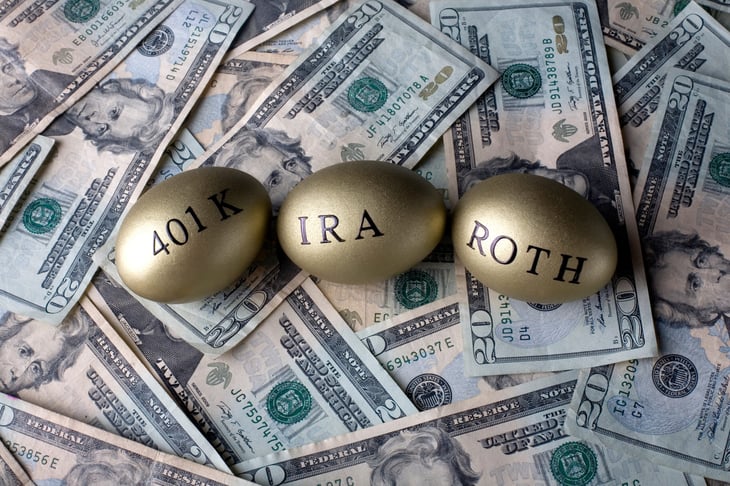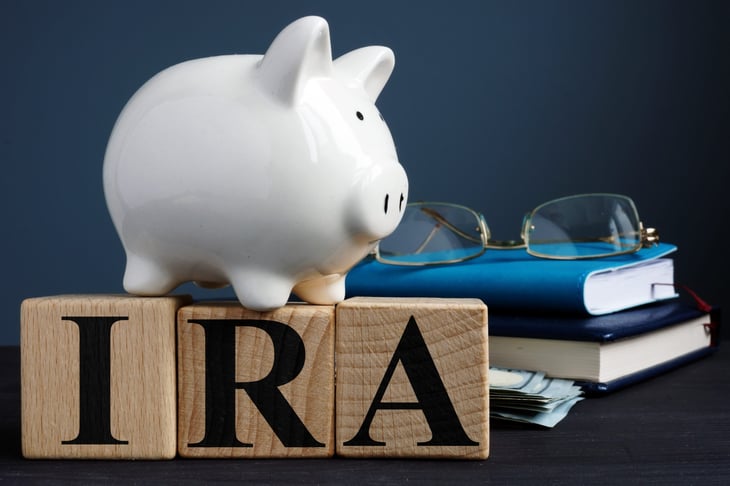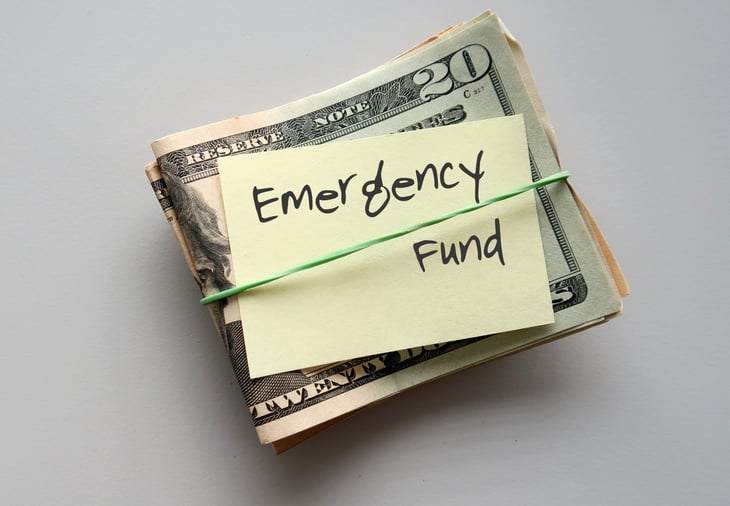
Editor's Note: This story originally appeared on NewRetirement.
Feeling frazzled by holiday fanfare? Do you also have nagging worries about your retirement plans?
One of the best ways to control stress of any kind is to make a list and check it twice. We have made your year-end financial planning list for you.
Now all you need to do is check them off: things you should do around each year’s end to set yourself up for a secure and happy future.
1. Take a Minute to Identify the Financial Good and Bad

It is a best practice for most endeavors to identify the strengths and weaknesses of performance. Your financial life is no different.
So, what did you do well financially this year? Where are the areas you could improve?
This has been a year like no other, so there is probably a lot to assess.
2. Establish Financial Goals for the Next Year and Every After

What do you plan to earn, spend and save next year? What other financial goals do you have? Do you have debt? Should you work on paying that down?
Can you do a better job with investments or insurance? Have an idea for a side gig to bring in some extra money?
What are you going to do about rising inflation and the possibility of lower stock market returns?
What about the amount of time you spend tracking and managing your finances? Can you set a goal of working on your finances for an hour every week or month?
Learn more about setting financial goals and get ideas below about setting financial goals.
3. Optimize Your Finances for Lower Lifetime Taxes

We are not about to try to give you tax advice here. However, now is the time to make some final moves to save yourself money on taxes.
Check out Year End Tax Advice for Retirees. Effective tax planning could be the most important year-end thing you do.
It is also a good time to strategize to save on future taxes.
4. If Eligible, Consider Opening an HSA

A Health Savings Account (HSA) is an account that gives you triple tax benefits — tax-deductible contributions, tax-deferred growth and tax-free withdrawals when you use the money to pay for qualified medical expenses.
If you are eligible (you have to have a high deductible health insurance plan), it can be an excellent place to stash your money.
Learn more about why an HSA is a great retirement savings option.
5. Evaluate Your Current Insurance Coverage

Insurance is a significant expense. And, it is important to get it right.
- Early Retirement Health Insurance: If you are retiring before age 65, make sure you can find affordable medical coverage to bridge you to Medicare eligibility. Explore 9 ways to cover your health costs for an early retirement.
- Medicare: If you already have Medicare, be sure to assess your coverage. Actively shop for the best Medicare supplemental policy each and every year. Your health will change and the policies change. It is worthwhile to rethink your coverage annually. Here are 10 tips for getting great coverage.
- Long-Term Care: You may also want to look at ways to fund long-term care costs. Long-term care is not covered by Medicare or Medicare supplemental insurance.
- Your Home and Other Assets: Review all of the policies covering your home and car and any other assets.
- Life Insurance: Your need for life insurance in retirement depends on a number of factors. Explore 7 instances when it is a good idea to have a policy.
- Dental and Vision: Make sure you know how you’ll cover these expenses.
- Lifetime Annuity: Annuities are often considered investments, but they are actually insurance products. A lifetime annuity guarantees your income and can be a good way to make sure you have money if you live longer than you expect.
6. Figure Out Exactly What You Need for Retirement (or the Rest of Retirement)

Whether you are already retired, or nearing retirement, you need to know exactly how much money you will need to live comfortably for the rest of your life.
According to a Merrill Edge Report, 19 percent of mass affluent Americans — U.S. households with investable assets ranging from $50,000 to $250,000 — have no idea how much they will need. And the guesstimates are wide ranging:
- 9 percent think they will need more than $2 million
- 14 percent believe they will need $1 million to $2 million
- 24 percent say $500,000 to $1 million
- 23 percent say $100,000 to $500,000
- 9 percent say $0 to $100,000
- And 19 percent say they just don’t know
So, how do you figure it out? You have options. You can find a high-quality financial advisor or use a respected online calculator — just beware of simple tools.
While planning does not need to be scary, it can be complicated. The NewRetirement Planner makes reliable and personalized planning easy.
7. Think You Already Know What You Need? Check Again

Creating a retirement plan is not something you do once and then never revisit. Experts recommend that updating all aspects of your plan be part of your yearly retirement checklist — doing this quarterly is even better.
Lots of things change and evolve. Your plan needs to stay current with these developments. For example:
- Investments might not have performed as you projected. And, you need to update savings balances.
- Your home’s value may have increased.
- Has your income changed? It is great to update this income stream.
- The inflation rate changed.
- Perhaps your children moved back home.
- And much more…
Just make sure your retirement plan reflects your current situation and your best guesses about what will happen in the future.
8. Over 72? Be Sure to Take Your Required Minimum Distributions

A report from Fidelity Investments says 61% of their account holders who are older than 72 (70 1/2 if you turned 70 1/2 before Jan. 1, 2020) have not yet taken their Required Minimum Distributions (RMDs).
Yikes! Now is the time!
Don’t overlook this important yearly retirement checklist task! In most years, if you are older than 72, you are required to withdraw from your retirement accounts before the end of the year or else you will owe hefty penalties.
Are you worried about the taxes you will pay? Here are 6 strategies to help you minimize the costs of these RMD withdrawals — especially if you don’t need to use the money now.
9. Still Working? Max Out Your Retirement Savings

If you haven’t reached the contribution limits on retirement savings plans like 401ks and IRAs, then you may want to figure out a way to stash more money into these accounts. Have a year-end bonus? Cash gifts? A little extra money lying around?
Putting money into a retirement saving plan can have multiple benefits: You can:
- Defer paying taxes on the amount contributed
- Build your retirement savings and compound those savings with future investment earnings
- Boost the value of your savings if your employer makes 401(k) matching contributions
The 2023 contribution limits are:
- $22,500 for 401ks, 403bs, 457s as well as Thrift Savings Plans. And, if you are 50 or older, the catch-up contribution is an additional $7,500. So, you can save a total of $30,000!
- $6,500 for IRAs. And, the catch-up contribution for people 50 or older is $1,000. So, you can save up to $7,500 with tax advantages.
And, remember that you can max out both kinds of savings vehicles — and don’t forget to consider putting it in a Roth account!
10. Did You Spend Less This Year? Stick It in Savings!

With inflation, it was hard to spend less, but perhaps your economizing really paid off. Did you perhaps forgo lattes? Eat fewer meals out? No vacation?
If you reduced costs, stash those funds into retirement savings!
And, if you have a long enough time horizon, investing your savings in the stock market while it is down could potentially pay off big in the future.
11. Boost Your Monthly Savings Rate

Another important thing to do if you are still working is to try to boost your savings rate.
You may have received a bump in income this year. While it may be difficult due to inflation, you should definitely consider using that bump to increase how much you save each month.
12. Save, Don’t Spend, Your Year-End Bonus

According to a survey by Aon Hewitt, 91% of all employees have compensation packages that may include a year-end bonus.
Consider the real pros and cons of getting that money into retirement savings.
Thought experiment: Imagine yourself next year (and five years after that) having splurged and spent your bonus. And, also visualize yourself having saved.
Really consider how you will feel in the future, it may help you to save at least some of your bonus.
13. If You Haven’t Already, It Is Time to Automate Your Savings

Speaking of monthly savings, if you haven’t automated the retirement savings process, you should do that now.
Saving for retirement takes willpower. However, if you automate your savings, you’ll only need one burst of willpower to start the automatic withdrawals, then you won’t have to think about it.
Commit – right now — to automating saving for retirement or to boosting the amount you are already saving.
Don’t think about it; don’t consider how you might use that extra money for any non-retirement activities.
14. Create or Assess Your Investment Plan

Investment plan? Yes! You need an investment plan and if you already have one, you need to assess if it is still adequate to serve your current and future needs.
An investment plan defines your strategy for how to invest your money and what to do when certain financial events occur.
Arguably the most important part of your plan is defining your asset allocation strategy — how much of your money is held in different kinds of investments: stocks, funds, bonds, CDs, real estate and more….
Here are some resources for investment planning:
- Is a retirement bucket strategy right for you and your money?
- Creating an investment policy statement
15. Re-balance Your Investments

Are you still in your optimal asset allocation positions? If not, it may be time to re-balance to restore your target percentages.
By re-balancing your investments, you can effectively minimize risk.
Re-balancing essentially involves buying and selling portions of an investment portfolio to bring the weight of each asset class back to its target state.
16. Review Your Social Security Statement

You don’t have to be in your 60s to check in on your Social Security.
In fact, if you have had a job, it is a good idea to check your benefits annually to make sure that your earnings and Social Security contributions are being recorded accurately.
It is easy to set up an online My Social Security account.
17. Assess If You Need a Financial Advisor

As you review your retirement finances, you may find that you could benefit from the help of a financial advisor. Here are 5 reasons why you might want to seek help from an advisor:
- Get confidence and peace of mind about your retirement finances
- Reduce tax liabilities and maximize wealth
- Construct and maintain the optimal asset allocation strategy, including a well-defined action plan for using assets for retirement income
- Help with making rational decisions — not emotional ones
- Keeping your finances up to date and making sure you don’t miss opportunities due to indecision or procrastination
18. Do You Have an Emergency Fund?

According to Bankrate, only 39% of people can cover a $1,000 setback using their savings.
Where does the money come from when the unexpected happens? More than likely, it comes from the retirement fund. And that’s a risky game to play.
Most financial experts recommend saving no less than 3 to 6 months’ worth of living expenses available in an easy-to-access checking account, with 6 to 9 months being a safer amount to work toward.
The rest of your money should be working for you and earning interest.
19. Consider a Roth Conversion

Roth conversions and figuring out the best time to use them can be complicated. With traditional retirement savings accounts, you pay taxes when you withdraw money from the account.
Roth accounts, on the other hand, are taxed when you invest the money.
Converting traditional funds into a Roth account can be a smart move in years when you are reporting a low income or have a lot of deductions.
Learn more about a Roth conversion.
20. Review Expenses

As the year nears a close, now is as good a time as ever to look over your expenses from the past 12 months in order to get an idea of how much you’ve spent. This will help you plan for the future.
You may also want to make sure that your retirement plans take into consideration the different phases of spending you will likely experience throughout retirement.
It is widely accepted that there are three stages of retirement — each with fairly predictable spending needs and levels.
- Phase 1 – Early Retirement: The first stage of retirement is characterized as a time of adventure and experience. With more free time and relative health, there are a lot of opportunities for spending money. Some experts recommend that retirees budget for spending 20 percent more in this phase.
- Phase 2 – Middle Retirement: While you may still be enjoying adventures in middle retirement, many people find that they simply spend more time with friends and family and stay a little closer to home. In this phase, your retirement spending may be at its lowest levels.
- Phase 3 – Later Retirement: No matter how healthy you are and how well you age, there is no denying that healthcare expenses ramp up as you get older. In fact, healthcare costs grow so much that this last phase of retirement is usually the most expensive phase of life. Out-of-pocket medical spending and long-term care costs absolutely skyrocket.
21. Review Where You Live and Your Housing Situation

Where you live plays a huge part in your satisfaction with retirement. And, your home is also probably your biggest expense and most significant asset.
Now is a good time to assess whether you are satisfied with where you live and whether or not it is a good fit for your finances and desired lifestyle.
22. Assess Your Mortgage

The year’s end is a good time to assess where you stand with your home and make plans for where you live and your home equity. You may want to:
- Set a goal of paying off your mortgage
- Tap home equity for retirement
- Relocate to a place better suited to your interests
23. Review Estate Plans

An estate plan can ensure that your loved ones are cared for. A good estate planner or financial advisor will also help you maximize your wealth.
- Check Beneficiary Designations: Ensure that all beneficiary designations on life insurance policies, annuities and retirement accounts like IRAs and 401(k)s are up-to-date. Beneficiary designations govern how these assets pass to heirs and they supersede any other directives like a will.
- Make Sure Wills and Trusts Are Updated: It is sadly common for people to neglect estate planning. Prince, Aretha Franklin and Michael Jackson all died without a will. And thousands die every year with an estate plan that was not recently updated.
24. Medical Checkups and Health Goals

Getting medical appointments can be difficult at the end of the year – especially this year – but it is important to make sure you are having regular checkups.
You should also use this time to set goals for your physical (and mental) health.
25. Last, but NOT Least: Assess and Set Goals for Your Time

When it comes to retirement planning, everyone’s goal is pretty much the same: create a plan so that you may live happily and comfortably in your non-working days.
However, to have success with this goal, you need to make it much more specific, set priorities and visualize exactly the future you want.
You can set retirement goals for the near term — this year — or for the rest of your life.
But, the most important goals you have are related to your lifestyle.
What are your beliefs? What do you most care about? What do you want to be remembered for? How do you want to spend your time in retirement and with whom?
Plan for what really matters to you.






Add a Comment
Our Policy: We welcome relevant and respectful comments in order to foster healthy and informative discussions. All other comments may be removed. Comments with links are automatically held for moderation.